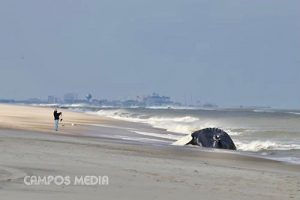
ASSATEAGUE — Ten days after a deceased 30-ton humpback whale washed up on Assateague, the creature was finally removed from the beach last weekend, but its presence on the barrier island will likely remain for a while.
On Feb. 18, a female humpback whale stranded on the beach at Assateague for reasons unknown and perished. Throughout the following week, Maryland Department of Natural Resources (DNR) biologists conducted a necropsy and collected tissue samples in an effort to determine the whale’s cause of death, the results of which are not yet known, although early indications are there are no signs of a non-natural death.
As of late last week, the deceased whale remained in the same position on the beach where it stranded. Assateague Island National Seashore crews last Tuesday attempted to move the whale from the beach to no avail.
Last weekend, with the necropsy completed and the tissue samples collected, Assateague Island National Seashore crews again attempted to move the whale from the beach, this time with success. According to a statement from the AINS Superintendent Monday, crews used heavy equipment over two days last weekend to remove the deceased whale from the shoreline and moved it to an undisclosed location on the island.
“The whale was successfully moved off the beach on Saturday,” the superintendent’s statement reads. “Thank you to the talented team of park staff, and especially the heavy equipment operators, who labored and innovated to finally successfully move the 30-ton animal. This process took approximately five hours over two days.”
While it is not clear exactly where the whale’s carcass has been moved, it will continue to make its presence felt on the barrier island. Because Assateague Island is essentially a natural, wild area, the marine mammal will decompose naturally, according to the superintendent’s statement.
“The whale will be allowed to decompose naturally, as would any dead animal within the boundaries of the seashore,” the statement reads. “Be advised there will be period when this process includes strong, unpleasant smells. For that reason, approaching the carcass is not advised. Also, the remains are protected by the Marine Mammal Protection Act, which makes it unlawful to collect or take any parts of a dead marine mammal.”
The female humpback was a well-known visitor to the Gulf of Maine affectionately known as Pivot. Pivot was first cataloged by the Center for Coastal Studies in 2008. She was regularly sighted in the Gulf of Maine and was also known in the North Atlantic Humpback Whale Catalog maintained by Allied Whale at the College of the Atlantic.

